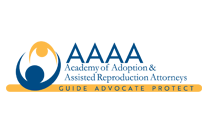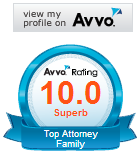Karen Persis was selected for inclusion as a Florida Super Lawyers Rising Star for 2014. To be eligible as a Rising Star, a candidate must be either 40 years old or younger, or in practice for 10 or fewer years. Karen Persis began her practice in 2005. Although Super Lawyers includes up to 5% of lawyers in Florida, there are fewer Rising Stars — only 2.5% of attorneys are named to this list. Ms. Persis has previously been named a Rising Star in 2010, 2011, 2012, 2013. She is honored to be selected again in 2014.
Karen Persis installed as President of the Young Lawyers Section of the Orange County Bar Association
Karen Persis was installed last night as the President of the Young Lawyers Section of the Orange County Bar Association. Ms. Persis, who has been practicing law in Orlando since 2005, will lead the organization through May 31, 2015. The YLS includes about 750 attorneys in Orange County who are 35 and under. The organization partners with several Central Florida community groups for volunteer projects. Karen is very proud of this accomplishment, and looks forward to serving her community.
Are Egg Donation Fees Tax-Exempt?
We will soon find out. Well, at least before the end of 2014, we will.
Generally, Egg Donors are compensated for the inconvenience, pain and suffering related to egg donation. Egg Donation Agreements usually include a provision that the law is unsettled regarding the tax implications for the fees associated with the Agreement, and that a tax expert should be consulted. As an attorney, and not an accountant, I cannot advise my egg donor clients of the tax consequences of receiving these funds. Anecdotally, I have heard stories going both ways — donors who were taxed, and donors who were not taxed because the compensation is not employment — it is for pain and suffering.
Nichelle Perez, and egg donor in California, received two fees of $10,000.00 each for egg donation. She did not report the fees as income. However the egg donation agency, The Donor Source, reported to the IRS that it had paid her. The IRS has requested Perez pay taxes on the amount, as it is deeming the egg donation “an act of commerce.” Perez has challenged the IRS, and a U.S. Tax Court will be making the decision this year.
Kansas Sperm Donor Ordered to Pay Child Support; Appeal Pending
In March 2009, William Marotta answered an advertisement on Craigslist in Kansas for a sperm donor. The ad was listed by a lesbian couple, Jennifer Schreiner and Angela Bauer, who had been together for eight years at that time. Before the donation took place, the parties signed a contract (and by all accounts, it seems as though an attorney was not used) that relinquished Marotta of parental responsibility and child support obligations. The intention of all involved was that he would not be a father to any child created from his donation. Marotta donated his sperm for free.
The parties chose not to use a doctor for the insemination. Instead, a catheter and syringe was used to inseminate Schreiner. The child was born in 2009.
Schreiner later sustained an injury that required her to seek public assistance from the state of Kansas. When the state realized that Schreiner had a child, it sought to have Marotta declared as the child’s father and hold him financially responsible. The state argued that because a doctor was not used in the insemination process, Marotta had no protection under Kansas law. The law in Kansas, entitled the Kansas Parentage Act, provides that a donor will not be considered a parent, but it also requires that the insemination occur via medical doctor. Because there was no doctor involved, the state argued, Marotta should be required to pay child support, as the state considered him a father and not a donor. The idea behind the state law is that a doctor could certify that the mother and donor have no connection. It would prevent men and women who were in relationships from saying that the man was merely a sperm donor, when a child was conceived through intercourse and not through insemination.
In late January 2014, Shawnee County District Court Judge Mary Mattivi ruled that a “parent may not terminate parental rights by contract…even when the parties have consented.” She determined that the contract was not valid because a doctor was not used, and ordered Marotta to pay thousands of dollars in child support. He is appealing the ruling.
There is concern that this case could have a chilling effect on others who would consider being donors, but do not want to later be burdened with a lawsuit and potentially child support payments. It is important to always consult with a lawyer before entering into an agreement related to assisted reproductive technology, as it is an always-evolving area of law.






